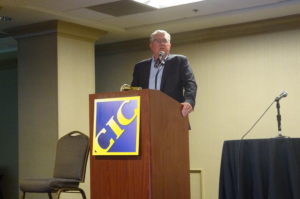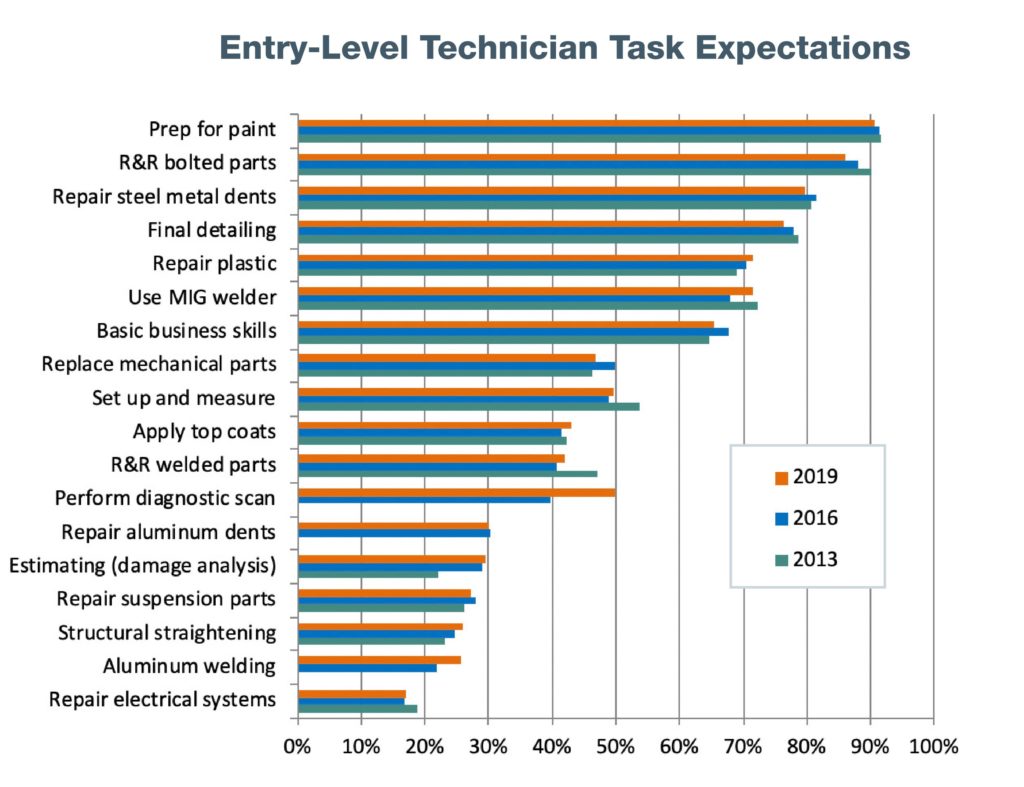
SEMA Week CIC agenda features interview with Seebachans, ‘Cost of Quality’ panel
By onAnnouncements | Associations | Business Practices | Education | Insurance | Market Trends | Repair Operations | Technology
Though an appearance by the couple injured in the Honda Fit fixed by John Eagle Collision is likely to be the most riveting part of the summit, repairers, insurers, vendors and others should find plenty of interest in next month’s Collision Industry Conference.
An agenda released Tuesday for the Nov. 5 gathering finds the CIC scheduling significant blocks of time to examine what to call parts falling outside of obvious boxes, how OEM technology might impact estimating, and “The Cost of Quality.”
Anyone with an business or personal interest in collision repair is welcome to participate in the CIC, which will run from 8 a.m. to 5 p.m. Tuesday, Nov. 5, at the Renaissance Hotel in Las Vegas (shuttles from the SEMA-adjacent Westgate are available). It’s a forum meant to bring all the stakeholders together in a room to educate each other on and debate various industry issues. It’s also a great chance to network, both in the hallways around the meeting and at the reception 6:30-9 p.m. at the Westgate that night. Register here.
Here’s some of the highlights from the agenda and some context for the sessions:
Data Access, Privacy, and Security Committee, 9:35 a.m.: This committee has been focusing on the impact of California’s Assembly Bill 375, which holds businesses doing $25 million or more in sales to higher standards regarding customer data. (Businesses that don’t make that kind of money but still handle 50,000 consumers a year also would qualify.)
Attorney Patrick McGuire told a July CIC audience he was already getting calls from shops with concerns about PII under the California law. “It’s very broad,” he said.
Committee Co-Chairman Frank Terlep (asTech) said then other legislatures are examining the topic as well.
It’s likely that providers nationwide will find themselves having to juggle protecting the customer’s data with their need to use and share it — all while trying to minimize their administrative and liability burden.
“This presentation will discuss how to determine who is accessing a business’s data, how they are, what’s being collected, how it is being used and much more related to data that may be moving through our industry,” the CIC agenda states. “In addition, the presentation will discuss a ‘Golden Rule’ position to be considered by the industry.”
Special “The Cost of Quality” presentation, 10:55 a.m.: This panel conversation looks like it will dig into one of the fundamental tensions in the collision industry.
CIC said it will include perspective from the repairer, insurer, OEM and consumer sides — four interests who aren’t always in sync on cost, quality and speed. Panelists include George Avery (Avery Knows; retired from State Farm) Erick Bickett (Fix Auto USA), Andy MacDonald (VeriFacts; also time at Tesla), Debby Robinson (Victory Management Group); and James Spears (Spears Consulting Group; retired from USAA).
“The panel will explore the advantages/challenges with business decisions that can impact quality,” CIC wrote in the agenda.
Technical Committee, 1 p.m.: Technical Committee Co-Chairmen Kye Yeung (European Motor Car Works) and Toby Chess (Kent Automotive) will talk about “the testing of spot welds and why it is important to the quality and safety of a repair.”
Chess covered test welds earlier this year at an Society of Collision Repair Specialists open board meeting and again in a series of videos. It’s something that the industry might not be doing as often as it should.
Collision Advice CEO Mike Anderson in 2018 said every OEM he works with requires the test welds. The comments came during a webinar that highlighted how FCA demands the procedure. An earlier Anderson webinar pointed out a similar requirement for Toyota.
Yet CCC’s 2018 estimate databases revealed fewer than 1 percent of all repairable vehicle appraisals contained a manual entry for a destructive test weld. Of course, it also pointed out that more than 1 percent of the industry might be performing test welds — they just weren’t including them on an estimate.
Matthew and Marcia Seebachan interview, 1:30 p.m.: CIC Chairman Jeff Peevy (Automotive Management Institute) and his wife, Marie (Automotive Training Coordinators), will interview Matthew and Marcia Seebachan, the John Eagle plaintiffs who nearly died after the crash of their improperly repaired Honda Fit.
“Chairman Jeff Peevy makes good on his promise to fill the ’empty chair’ that has represented the consumer during the 2019 CIC meetings,” the agenda states. “Jeff and his wife Marie, will interview Marcia and Matthew Seebachan, owners of the infamous Honda Fit accident in Texas. This interview will focus strictly on the human impact of poor repair decisions and not on the companies or individuals involved in the court case.”
Jeff Peevy has spent a large part of this year attempting to set up this appearance, and initially, he wasn’t sure if the Seebachans were even able to travel given their health issues. One idea was to fly down and do the interview in Texas, but as the conversations progressed, Marcia Seebachan was “bent on getting her story out,” Peevy said.
He said the Seebachans might have seemed like “these ‘storybook people’ we read about” — abstract characters in print — but he wanted the industry to understand they were “real people” with “real pain.”
Parts and Material Committee, 2 p.m.: Committee Co-Chairs Aaron Schulenburg (SCRS) and Ken Weiss (SSF Imported Auto Parts) earlier this year reported being stuck on the question: What do you call an OEM part intended for the U.S. market but sold outside of the authorized OEM supply process and/or not warrantied by the automaker?
“The Parts and Material Committee highlights the challenges and opportunities identified in the ongoing parts definitions discussions and the various perspectives within the industry,” the agenda for Nov. 5 states.
The industry will probably need to resolve this issue quickly given certain external pressures.
California — one of the most important collision and insurance markets in the country — said in 2018 repairers can’t use vague terms like “Opt-OE,” only those designations found in state codes. The California Bureau of Automotive Repair is considering a regulation which would further define an “OEM crash part” as one “recognized by the specific vehicle manufacturer as its own part or obtained through a distributor authorized by the vehicle manufacturer.”
An intellectual property attorney and case law has suggested that designating a part with a “material difference” as new OEM could open up a vendor to a trademark lawsuit under the Lanham Act. One such difference could be the absence of an OEM warranty, Boston-based Burns & Levinson LLP partner Mark Schonfeld said.
Education and Training Committee, 3 p.m.: The committee will look at entry-level technician expectations, a topic that must find vo-tech schools and collision repairers in sync. Otherwise, the schools will waste resources producing overqualified candidates or waste employers’ time by delivering unprepared students. Neither gets educators and repairers closer to the optimal school-to-shop pipeline for efficiently alleviating the tech shortage.
“This presentation begins with an ASE presentation and then a short review of the Entry-Level Technician Task Expectations from the CREF Snapshot, a follow-up on the ASE Ed Foundation Survey and a discussion on Entry-Level tasks,” the agenda states.
According to Collision Industry Conference Talent Pool Committee member Gene Lopez (Seidner’s Collision Centers), an employer would be ecstatic if a entry-level graduate knew how to do just four things: How to remove and replace a bolted-on part, fix a small dent. prep a car for paint and detail a vehicle.
A 2019 CREF and I-CAR industry study found employers only expected technical school graduates to be competent in an average of 9.3 tasks.
Estimating Committee, 4:20 p.m.: Estimating Committee Chairman Roger Cada (Accountable Estimating) will host Dan Black, FCA advanced body development and collision repair manager, and Scott Kaboos, Honda collision repair chief instructor.
“The estimating committee will discuss various estimating challenges new vehicle technology presents with OEM representatives,” the agenda states.
One possible topic here might be the absence of book times for technology and procedures either too new or too variable for the estimating services to pin down. Repairers and insurers might have to calculate their own, which can lead to friction.
More information:
Collision Industry Conference website
Collision Industry Conference Nov. 5 agenda
CIC, Oct. 15, 2019
Images:
Collision Industry Conference Chairman Jeff Peevy (Automotive Management Institute) speaks to the Collision Industry Conference on Oct. 15, 2019. (John Huetter/Repairer Driven News)
The basic skills demanded of an entry-level technician remain fairly consistent, according to a Collision Repair Education Foundation and I-CAR study. (Provided by CREF)

